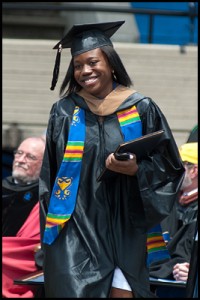“Over the past three decades, our nation has witnessed great increases in college-going rates—no doubt due in part to widespread efforts by education policymakers and college access practitioners. Yet despite progress, just over half of students enrolled in four-year institutions graduate within six years (NCES 2009).”
This disparity between college access and college success rates was the motivation for the Pathways to College Network (directed by the Institute for Higher Education Policy) and the National College Access Network to release a “Research to Practice Brief” on how social supports and self-efficacy affect the success of underrepresented student populations. The brief is part of the Pathways to College Network’s effort to promote the need for college retention support services that address both the academic and social needs of college students. To learn more about the college success field, they called on Bottom Line.
Bottom Line believes as the Pathways to College Network does: that students need to be supported as both academic achievers and, well, as human beings. That’s why our College Success Program model focuses on four areas (academics, employment, financial aid, and emotional wellbeing), not simply academics. As the brief states, “In Bottom Line’s experience, the more confident its students are in their preparation and the more supported the students feel, the more likely they are to succeed in college.”
To learn more about the role of social support and self-efficacy in college retention, read a summary of the brief or the full brief.


